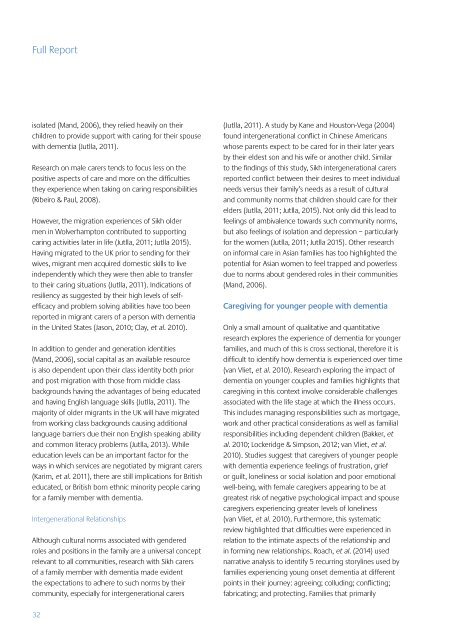The experiences needs and outcomes for carers of people with dementia
RSAS-ADS-Experiences-needs-outcomes-for-carers-of-people-with-dementia-Lit-review-2016
RSAS-ADS-Experiences-needs-outcomes-for-carers-of-people-with-dementia-Lit-review-2016
You also want an ePaper? Increase the reach of your titles
YUMPU automatically turns print PDFs into web optimized ePapers that Google loves.
Full Report<br />
isolated (M<strong>and</strong>, 2006), they relied heavily on their<br />
children to provide support <strong>with</strong> caring <strong>for</strong> their spouse<br />
<strong>with</strong> <strong>dementia</strong> (Jutlla, 2011).<br />
Research on male <strong>carers</strong> tends to focus less on the<br />
positive aspects <strong>of</strong> care <strong>and</strong> more on the difficulties<br />
they experience when taking on caring responsibilities<br />
(Ribeiro & Paul, 2008).<br />
However, the migration <strong>experiences</strong> <strong>of</strong> Sikh older<br />
men in Wolverhampton contributed to supporting<br />
caring activities later in life (Jutlla, 2011; Jutlla 2015).<br />
Having migrated to the UK prior to sending <strong>for</strong> their<br />
wives, migrant men acquired domestic skills to live<br />
independently which they were then able to transfer<br />
to their caring situations (Jutlla, 2011). Indications <strong>of</strong><br />
resiliency as suggested by their high levels <strong>of</strong> selfefficacy<br />
<strong>and</strong> problem solving abilities have too been<br />
reported in migrant <strong>carers</strong> <strong>of</strong> a person <strong>with</strong> <strong>dementia</strong><br />
in the United States (Jason, 2010; Clay, et al. 2010).<br />
In addition to gender <strong>and</strong> generation identities<br />
(M<strong>and</strong>, 2006), social capital as an available resource<br />
is also dependent upon their class identity both prior<br />
<strong>and</strong> post migration <strong>with</strong> those from middle class<br />
backgrounds having the advantages <strong>of</strong> being educated<br />
<strong>and</strong> having English language skills (Jutlla, 2011). <strong>The</strong><br />
majority <strong>of</strong> older migrants in the UK will have migrated<br />
from working class backgrounds causing additional<br />
language barriers due their non English speaking ability<br />
<strong>and</strong> common literacy problems (Jutlla, 2013). While<br />
education levels can be an important factor <strong>for</strong> the<br />
ways in which services are negotiated by migrant <strong>carers</strong><br />
(Karim, et al. 2011), there are still implications <strong>for</strong> British<br />
educated, or British born ethnic minority <strong>people</strong> caring<br />
<strong>for</strong> a family member <strong>with</strong> <strong>dementia</strong>.<br />
Intergenerational Relationships<br />
Although cultural norms associated <strong>with</strong> gendered<br />
roles <strong>and</strong> positions in the family are a universal concept<br />
relevant to all communities, research <strong>with</strong> Sikh <strong>carers</strong><br />
<strong>of</strong> a family member <strong>with</strong> <strong>dementia</strong> made evident<br />
the expectations to adhere to such norms by their<br />
community, especially <strong>for</strong> intergenerational <strong>carers</strong><br />
(Jutlla, 2011). A study by Kane <strong>and</strong> Houston-Vega (2004)<br />
found intergenerational conflict in Chinese Americans<br />
whose parents expect to be cared <strong>for</strong> in their later years<br />
by their eldest son <strong>and</strong> his wife or another child. Similar<br />
to the findings <strong>of</strong> this study, Sikh intergenerational <strong>carers</strong><br />
reported conflict between their desires to meet individual<br />
<strong>needs</strong> versus their family’s <strong>needs</strong> as a result <strong>of</strong> cultural<br />
<strong>and</strong> community norms that children should care <strong>for</strong> their<br />
elders (Jutlla, 2011; Jutlla, 2015). Not only did this lead to<br />
feelings <strong>of</strong> ambivalence towards such community norms,<br />
but also feelings <strong>of</strong> isolation <strong>and</strong> depression – particularly<br />
<strong>for</strong> the women (Jutlla, 2011; Jutlla 2015). Other research<br />
on in<strong>for</strong>mal care in Asian families has too highlighted the<br />
potential <strong>for</strong> Asian women to feel trapped <strong>and</strong> powerless<br />
due to norms about gendered roles in their communities<br />
(M<strong>and</strong>, 2006).<br />
Caregiving <strong>for</strong> younger <strong>people</strong> <strong>with</strong> <strong>dementia</strong><br />
Only a small amount <strong>of</strong> qualitative <strong>and</strong> quantitative<br />
research explores the experience <strong>of</strong> <strong>dementia</strong> <strong>for</strong> younger<br />
families, <strong>and</strong> much <strong>of</strong> this is cross sectional, there<strong>for</strong>e it is<br />
difficult to identify how <strong>dementia</strong> is experienced over time<br />
(van Vliet, et al. 2010). Research exploring the impact <strong>of</strong><br />
<strong>dementia</strong> on younger couples <strong>and</strong> families highlights that<br />
caregiving in this context involve considerable challenges<br />
associated <strong>with</strong> the life stage at which the illness occurs.<br />
This includes managing responsibilities such as mortgage,<br />
work <strong>and</strong> other practical considerations as well as familial<br />
responsibilities including dependent children (Bakker, et<br />
al. 2010; Lockeridge & Simpson, 2012; van Vliet, et al.<br />
2010). Studies suggest that caregivers <strong>of</strong> younger <strong>people</strong><br />
<strong>with</strong> <strong>dementia</strong> experience feelings <strong>of</strong> frustration, grief<br />
or guilt, loneliness or social isolation <strong>and</strong> poor emotional<br />
well-being, <strong>with</strong> female caregivers appearing to be at<br />
greatest risk <strong>of</strong> negative psychological impact <strong>and</strong> spouse<br />
caregivers experiencing greater levels <strong>of</strong> loneliness<br />
(van Vliet, et al. 2010). Furthermore, this systematic<br />
review highlighted that difficulties were experienced in<br />
relation to the intimate aspects <strong>of</strong> the relationship <strong>and</strong><br />
in <strong>for</strong>ming new relationships. Roach, et al. (2014) used<br />
narrative analysis to identify 5 recurring storylines used by<br />
families experiencing young onset <strong>dementia</strong> at different<br />
points in their journey: agreeing; colluding; conflicting;<br />
fabricating; <strong>and</strong> protecting. Families that primarily<br />
32


